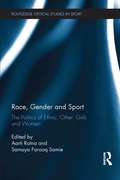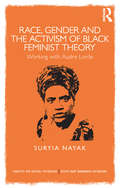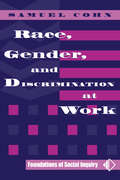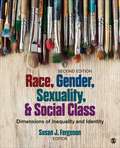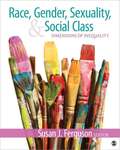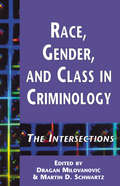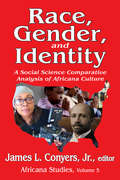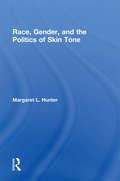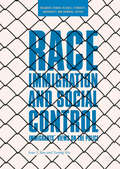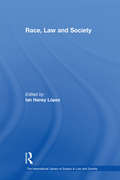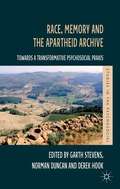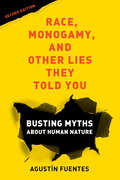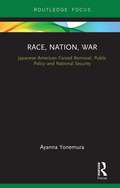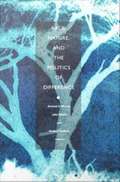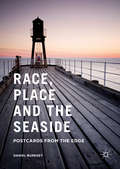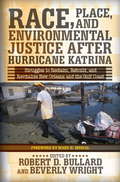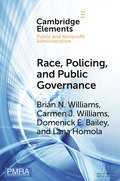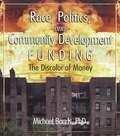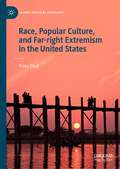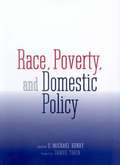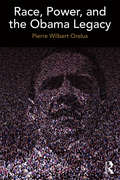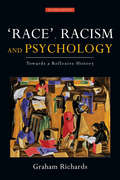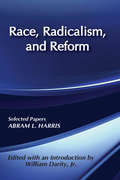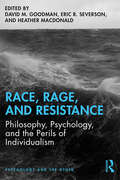- Table View
- List View
Race, Gender and Sport: The Politics of Ethnic 'Other' Girls and Women (Routledge Critical Studies in Sport)
by Aarti Ratna Samaya F. SamieThe experiences of ethnic ‘Other’ females have – until recently – been widely overlooked in the study of sport. There continues to be a need to produce critical scholarship about ethnic 'Other' girls and women in sport and physical culture, in order to represent their complex, multifarious and dynamic lived realities. This international collection of critical essays provides compelling insight into the lived realities of ethnic ‘Other’ females in sport. Throughout the book, contributors either draw on the political consciousnesses of ‘Other’ feminisms, or privilege the voices of ethnic 'Other' girls and women so as to broaden, diversify and advance critical thinking pertaining to ethnic ‘Other’ females in sport and physical culture. The purpose of the collection is both to produce knowledge and privilege otherwise subjugated knowledges, which individually and collectively present counter-narratives that better speak to the lived realities of racially oppressed groups of women and girls. Race, Gender and Sport: The Politics of Ethnic 'Other' Girls and Women is important reading for all students and scholars with an interest in the sociology of sport, gender studies, or race and ethnicity studies.
Race, Gender and the Activism of Black Feminist Theory: Working with Audre Lorde (Concepts for Critical Psychology)
by Suryia NayakBeginning from the premise that psychology needs to be questioned, dismantled and new perspectives brought to the table in order to produce alternative solutions, this book takes an unusual transdisciplinary step into the activism of Black feminist theory. The author, Suryia Nayak, presents a close reading of Audre Lorde and other related scholars to demonstrate how the activism of Black feminist theory is concerned with issues central to radical critical thinking and practice, such as identity, alienation, trauma, loss, the position and constitution of individuals within relationships, the family, community and society. Nayak reveals how Black feminist theory seeks to address issues that are also a core concern of critical psychology, including individualism, essentialism and normalization. Her work grapples with several issues at the heart of key contemporary debates concerning methodology, identity, difference, race and gender. Using a powerful line of argument, the book weaves these themes together to show how the activism of Black feminist theory in general, and the work of Audre Lorde in particular, can be used to effect social change in response to the damaging psychological impact of oppressive social constructions. Race, Gender and the Activism of Black Feminist Theory will be of great interest to advanced students, researchers, political activist and practitioners in psychology, counselling, psychotherapy, mental health, social work and community development.
Race, Gender, And Discrimination At Work
by Samuel CohnRace, Gender, and Discrimination at Work is a review of the determinants of wage and employment discrimination by firms against minorities and women. Aimed at sociology undergraduates, the book assumes no pre-existing social scientific knowledge. Downplaying family and cultural factors in favour of an analysis of the roles played by organizational,
Race, Gender, Sexuality, And Social Class: Dimensions Of Inequality And Identity
by Susan J. FergusonAn eye-opening exploration of how socials statuses intersect to shape our identities and produce inequalities. In this fully edited and streamlined Race, Gender, Sexuality, and Social Class: Dimensions of Inequality and Identity, Second Edition, Susan Ferguson has carefully selected readings that open readers’ eyes to the ways that social statuses shape our experiences and impact our life chances. The anthology represents many of the leading voices in the field and reflects the many approaches used by scholars and researchers to understand this important and evolving subject. The anthology is organized around broad topics (Identity, Power and Privilege, Social Institutions, etc.), rather than categories of difference (Race, Gender, Class, Sexuality) to underscore this fundamental insight: race, class, gender, and sexuality do not exist in isolation; they often intersect with one another to produce social inequalities and form the bases of our identities in society.
Race, Gender, Sexuality, and Social Class: Dimensions of Inequality
by Susan J. FergusonRace, Gender, Sexuality, and Social Class: Dimensions of Inequality, edited by renowned researcher and scholar Susan Ferguson, presents a contemporary and compelling overview of race, ethnicity, gender, and social class issues in the United States today. Taking an intersectional approach, the book is organized topically, rather than focusing on specific race/ethnic subgroups. The content is framed around the themes of identity, experiences of race, class, gender or sexuality, difference, inequality, and social change or personal empowerment, with historical context threaded throughout to deepen the reader's understanding. With engaging readings and cutting-edge scholarship the collection is not only refreshingly contemporary but also relevant to students’ lives.
Race, Gender, and Class in Criminology: The Intersections (Current Issues in Criminal Justice)
by Martin D. Schwartz Dragan MilovanovicFirst published in 2000. This series is dedicated to creative, scholarly work in criminal justice and criminology. Moreover, we ask the authors to emphasize readability. In this anthology Martin Schwartz and Dragan Milovanovic have managed to produce a work that is a combination of both. They also did this in the face of difficulties presented by a variety of theoretical perspectives and methodologies. The subject matter of this anthology-race, gender, and class-is a critical one for criminology.
Race, Gender, and Identity: A Social Science Comparative Analysis of Africana Culture (Africana Studies)
by James L. ConyersThis volume examines race, gender, and identity in African American culture. As with previous volumes in the series, these collected essays provide a social science and interdisciplinary framework for the exploration of Africana cultural and social phenomena. The contributors have adopted mixed methods and meta-theory tools of analysis to describe and evaluate these issues from an African-centered perspective.Kameelah Martin examines the role of women in the films of Julie Dash and Kasi Lemmons. Toya Roberts offers an experimental study of African American males at predominantly white institutions of higher education. Rochelle Brocks digs into the transition, transformation, and transcendence of civil rights to the Black Arts/Black Power movements for social change. Portia K. Maultsby provides an ethnographic study, inspecting the genre of funk music in the United States. James L. Conyers, Jr. analyzes the doctoral dissertation of W. E. B. Du Bois, which cataloged the impact of colonialism on Africana culture. Kesha Morant Williams and Ronald L. Jackson II examine the impact of lupus on the identity of African American women. Ronald Turner's essay examines black workers challenging racist practices by their union representatives. Lisbeth Gant-Britton renders a conceptual history of the hip-hop community, with emphasis on international issues. This volume is an invaluable sourcebook for those studying African American affairs, history, and cultural studies.
Race, Gender, and Leadership: Re-Envisioning Organizational Leadership From the Perspectives of African American Women Executives
by Patricia S. ParkerMuch has been written about a model of leadership that emphasizes women's values and experiences, that is in some ways distinct from male models of leadership. This book redirects the focus to a view of leadership as a multicultural phenomenon that moves beyond dualistic notions of "masculine" and "feminine" leadership, and focuses more specifically on leadership as the management of meaning, including the meanings of the notion of "organizational leader. " This volume focuses on leadership "traditions" revealed in the history of Black women in America and exemplified in the leadership approaches of 15 African American women executives who came of age during the civil rights and feminist movements of the 1960's and 1970's and climbed to the top of major U. S. organizations. It advances a vision of organizational leadership that challenges traditional masculine and feminine notions of leadership development and practice, providing insights on organizational leadership in the era of post-industrialization and globalization. Additionally, by placing African American women at the center of analysis, this book provides insights into the ways in which race and gender structure key leadership processes in today's diverse and changing workplace. It is a must-read for scholars and researchers in organizational communication, management, leadership, African American studies, and related areas.
Race, Gender, and the Politics of Skin Tone
by Margaret L. HunterRace, Gender, and the Politics of Skin Tone tackles the hidden yet painful issue of colorism in the African American and Mexican American communities. Beginning with a historical discussion of slavery and colonization in the Americas, the book quickly moves forward to a contemporary analysis of how skin tone continues to plague people of color today. This is the first book to explore this well-known, yet rarely discussed phenomenon.
Race, Immigration, and Social Control: Immigrants' Views On The Police (Palgrave Studies In Race, Ethnicity, Indigeneity And Criminal Justice Ser.)
by Ivan Y. Sun Yuning WuThis book discusses the issues surrounding race, ethnicity, and immigrant status in U.S. policing, with a special focus on immigrant groups’ perceptions of the police and factors that shape their attitudes toward the police. It focuses on the perceptions of three rapidly growing yet understudied ethnic groups – Hispanic/Latino, Chinese, and Arab Americans. Discussion of their perceptions of and experience with the police revolves around several central themes, including theoretical frameworks, historical developments, contemporary perceptions, and emerging challenges. This book appeals to those interested in or researching policing, race relations, and immigration in society, and to domestic and foreign government officials who carry law enforcement responsibilities and deal with citizens and immigrants in particular.
Race, Law and Society (The International Library of Essays in Law and Society)
by Ian Haney LópezRace, Law and Society draws together some of the very best writing on race and racism from the law and society tradition, yet it is not intended to merely reprint the greatest hits of the past. Instead, from its introduction to its selection of articles, this anthology is designed as a 'how-to manual', a guide for scholars and students seeking templates for their own work in this important but also tricky area. Race, Law and Society pulls together leading exemplars of the sorts of social science scholarship on race, society and law that will be essential to racial progress as the world begins to travel the twenty-first century.
Race, Memory and the Apartheid Archive
by Derek Hook Garth Stevens Norman DuncanRace, Memory and the Apartheid Archive: Towards a Transformative Psychosocial Praxis draws on a psychosocial approach that is uniquely suited to the socio-historical and psychical analysis of racism. The book relies mainly on the memories, stories and narratives of ordinary people living in apartheid South Africa.
Race, Monogamy, and Other Lies They Told You, Second Edition: Busting Myths about Human Nature
by Agustín FuentesA compelling takedown of prevailing myths about human behavior, updated and expanded to meet the current moment. There are three major myths of human nature: humans are divided into biological races; humans are naturally aggressive; and men and women are wholly different in behavior, desires, and wiring. Race, Monogamy, and Other Lies They Told You counters these pervasive and pernicious myths about human behavior. Agustín Fuentes tackles misconceptions about what race, aggression, and sex really mean for humans, and incorporates an accessible understanding of culture, genetics, and evolution that requires us to dispose of notions of "nature or nurture." Presenting scientific evidence from diverse fields, including anthropology, biology, and psychology, Fuentes devises a myth-busting toolkit to dismantle persistent fallacies about the validity of biological races, the innateness of aggression and violence, and the nature of monogamy, sex, and gender. This revised and expanded edition provides up-to-date references, data, and analyses, and addresses new topics, including the popularity of home DNA testing kits and the lies behind ‘"incel" culture; the resurgence of racist, nativist thinking and the internet's influence in promoting bad science; and a broader understanding of the diversity of sex and gender.
Race, Nation, War: Japanese American Forced Removal, Public Policy and National Security
by Ayanna YonemuraThis book examines international post-9/11 policies by connecting them to the US violations of Japanese Americans’ human rights during World War II. Analysing the policies of the United States, Race, Nation, War illustrates how ideas of race and masculinity shaped the indefinite leave policy which the government used to move Japanese Americans out of camps during the war. With attention to recent American and European policies, the author demonstrates that race, gender, and nation also converge in President Trump’s policies on refugees and human rights, the German and European migrant crises, and related German policies and politics. Assayed from a unique city and regional planning perspective, Race, Nation, War will appeal not only to scholars of planning, but also to those with interests in American Studies, gender studies, race and ethnicity, sociology, history, and public policy.
Race, Nature, and the Politics of Difference
by Donald S. Moore Jake Kosek Anand PandianHow do race and nature work as terrains of power? From eighteenth-century claims that climate determined character to twentieth-century medical debates about the racial dimensions of genetic disease, concepts of race and nature are integrally connected, woven into notions of body, landscape, and nation. Yet rarely are these complex entanglements explored in relation to the contemporary cultural politics of difference. This volume takes up that challenge. Distinguished contributors chart the traffic between race and nature across sites including rainforests, colonies, and courtrooms. Synthesizing a number of fields--anthropology, cultural studies, and critical race, feminist, and postcolonial theory--this collection analyzes diverse historical, cultural, and spatial locations. Contributors draw on thinkers such as Fanon, Foucault, and Gramsci to investigate themes ranging from exclusionary notions of whiteness and wilderness in North America to linguistic purity in Germany. Some essayists focus on the racialized violence of imperial rule and evolutionary science and the biopolitics of race and class in the Guatemalan civil war. Others examine how race and nature are fused in biogenetic discourse--in the emergence of "racial diseases" such as sickle cell anemia, in a case of mistaken in vitro fertilization in which a white couple gave birth to a black child, and even in the world of North American dog breeding. Several essays tackle the politics of representation surrounding environmental justice movements, transnational sex tourism, and indigenous struggles for land and resource rights in Indonesia and Brazil. Contributors. Bruce Braun, Giovanna Di Chiro, Paul Gilroy, Steven Gregory, Donna Haraway, Jake Kosek, Tania Murray Li, Uli Linke, Zine Magubane, Donald S. Moore, Diane Nelson, Anand Pandian, Alcida Rita Ramos, Keith Wailoo, Robyn Wiegman
Race, Place and the Seaside
by Daniel BurdseyThis is the first academic monograph to focus exclusively on issues of race, ethnicity, whiteness and multiculture at the English seaside. The book calls for acknowledgement of the racialised nature of this environment, and proposes that its distinctive spaces, places, traditions and narratives should be included within broader analyses of race in contemporary Britain. Introducing the concept of 'coastal liquidity' to explain shifting ethno-racial demographics, migratory politics and spatial dynamics at the edge of the sea, along with the relative im/mobilities of the minority ethnic communities who move and reside there, the author provides a relational exploration of seaside experiences: both as a locus of racialised categorisation, exclusion and subjugation, and one of resistance, conviviality and intercultural exchange. Combining theoretical insight and empirical fieldwork, the book disrupts dominant thinking that fixes ontologically minority ethnic bodies to urban spaces, and overcomes their erasure and silencing from the seaside landscapes of the popular imagination.
Race, Place, and Environmental Justice After Hurricane Katrina
by Robert D. Bullard Beverly WrightOn August 29, 2005, Hurricane Katrina made landfall near New Orleans leaving death and destruction across the Louisiana, Mississippi, and Alabama Gulf Coast counties. The lethargic and inept emergency response that followed exposed institutional flaws, poor planning, and false assumptions that are built into the emergency response and homeland security plans and programs. Questions linger: What went wrong? Can it happen again? Is our government equipped to plan for, mitigate, respond to, and recover from natural and manmade disasters? Can the public trust government response to be fair? Does race matter? Racial disparities exist in disaster response, cleanup, rebuilding, reconstruction, and recovery. Race plays out in natural disaster survivors' ability to rebuild, replace infrastructure, obtain loans, and locate temporary and permanent housing. Generally, low-income and people of color disaster victims spend more time in temporary housing, shelters, trailers, mobile homes, and hotels--and are more vulnerable to permanent displacement. Some "temporary" homes have not proved to be that temporary. In exploring the geography of vulnerability, this book asks why some communities get left behind economically, spatially, and physically before and after disasters strike.
Race, Policing, and Public Governance: On the Other Side of Now (Elements in Public and Nonprofit Administration)
by Brian N. Williams Carmen J. Williams Domenick E. Bailey Lana HomolaI can't breathe … a haunting phrase moaned at the intersection of past and present, serving as an audible supplement to the visual evidence to yet another collision of race and policing. This phrase reflects the current state of police-community relations in the United States. But, what lies on the other side of now? This Element examines this salient question in the context of excessive use of force and through the lenses of race, policing and public governance. We draw upon extant research and scholarship on representative bureaucracy, public engagement in the co-creation of public polices and the co-production of public services, and the emerging findings from studies in network science, coupled with insights from elite interviews, to offer implications for future research, the profession of policing, the public policymaking process, public management, and post-secondary institutions.
Race, Politics, and Community Development Funding: The Discolor of Money
by Michael BondsLearn how racial and political bias often contribute to the misuse of funding and affect low income and minority communities! Share an insider&’s view of how race and politics impact the distribution of city services and how the promises of elected African Americans and liberal whites to poor communities are often broken. Authored by a noted expert in urban studies, Race, Politics, and Community Development Funding: The Discolor of Money follows federal money designated to alleviate urban poverty and blight at the local level. Using a variety of research methods, the author shows how key actors (mayor, council members, public bureaucrats) often contribute to the misuse of funds. Race, Politics, and Community Development Funding follows the trail of over $247 million allocated to the city of Milwaukee, Wisconsin, from 1975 to 1997. You&’ll learn where money designated to address problems of urban blight and poverty really went. Through interviews, participant observation, trace analysis, and a careful review of public records, this illuminating book follows that money and reveals the errors of those who argued that an increase in the number of black elected officials and community activists would result in more resources for low-income areas. Helpful charts, tables, and graphs illustrate the flow of federal dollars. With Race, Politics, and Community Development Funding you&’ll gain a better understanding of: how public bureaucracies are an extension of the executive branch, as opposed to being independent public agencies how some agencies have used a variety of inaccurate and biased methods and evaluations to fund-or not fund-community based organizations the shortcomings of African-American elected officials and biracial coalitions in obtaining resources for minority communities how education, job training, and youth/family services are as important as who gets elected to office and more! Race, Politics, and Community Development Funding: The Discolor of Money is a valuable resource for community organizers, low-income and minority advocates, undergraduate and graduate students interested in public policies, elected officials and bureaucrats who make funding and implementation decisions, and everyone interested in racial politics and urban community development.
Race, Popular Culture, and Far-right Extremism in the United States (Global Political Sociology)
by Priya DixitThis book analyzes key popular culture artifacts linked with United States’ far-right extremism to illustrate how extremists use various narrative strategies to legitimate their interests and goals and to justify violent actions. Recognizing these narrative strategies and how they are used partly explains the back and forth moves between mainstream politics and the far-right of ideas and issues that used to remain within far-right circles. The main objective of this book is to utilize theoretical approaches that centralize processes of racialization to analyze and explain how far-right extremists utilize recognizable narratives to mainstream and communicate their ideas. The book will illustrate processes by which racialized subjects are produced and violence justified. In order to do so, the book concentrates on popular culture as sources of how the far-right constitutes their identities and goals. It first develops a methodological plan to study popular culture artifacts that is drawn from scholarship on race and discourse analysis in International Relations (IR). It then analyzes far-right use of key popular culture artifacts, such as magazines, memes, and manifestos, to note how extremist identities and interests are produced, publicly communicated, and mainstreamed. This will contribute to Security Studies and IR’s understanding of far-right extremism, especially how they utilize similar narrative strategies as used in mainstream contexts to justify their calls for violence.
Race, Poverty, and Domestic Policy
by C. Michael HenryHenry (St. Anthony's College, Oxford, UK) collects 26 papers coming out of the interdisciplinary faculty seminars on racial inequality, poverty, and antipoverty policy in the United States conducted at Yale's Institution for Social and Policy Studies over the course of the 1990s. Papers consider connections between income inequality and economic inequality, measurement issues of inequality and poverty, structural causes of African American poverty, differential impact of skills on earnings, crime and poverty in inner cities, factors militating against progress for African Americans, welfare and familial hardship, and economic community development policies. Many of the papers are prescriptive in nature, while others explore policy experiences and impacts from the 1960s to 2000. Annotation ©2004 Book News, Inc. , Portland, OR (booknews. com)
Race, Power, and the Obama Legacy
by Pierre OrelusThis book critically examines Obama’s presidency and legacy, especially in regard to race, inequality, education, and political power. Orelus depicts an “interest convergence factor” that led many White liberals and the corporate media to help Obama get elected in 2008 and 2012. He assesses Obama’s political accomplishments, including parts of his domestic policies that support gay rights and equal pay for women. Special attention is given to Obama’s educational policies, like Race to the Top, and the effects of such policies on both the learning and academic outcome of students, particularly linguistically and culturally diverse students. In a race and power framework, Orelus relates domestic policies to the effects of Obama’s foreign policies on the lives of people in poorer countries, especially where innocent children and women have been killed by war and drone strikes authorized by Obama’s administration. The author invites readers to question and transcend the historical symbolism of Obama’s political victory in an effort to carefully examine and critique his actions as reflected through both his domestic and foreign policies.
Race, Racism and Psychology, 2nd Edition: Towards a Reflexive History
by Graham RichardsThis book offers a comprehensive overview of the ways in which Psychology has engaged with 'race' and racism issues since the late 19th century. It emphasizes the complexities and convolutions of the story and attempts to elucidate the subtleties and occasional paradoxes that have arisen as a result. This new edition updates the research contained in the first edition and includes brand new chapters. These additional chapters draw attention to the importance of the South African Black Consciousness movement and ‘Post-colonial’ Psychology, ?explore recent additional historical research on the fears of ‘hybridisation’, contain new material on French colonial psychiatry, and discuss the awkward status of virtually all the language and terms currently used for discussion of the topic. This important and controversial book has proved to be a vital text, both as a point of departure for more in-depth inquiries, and also as an essential reference tool.The additional up-to-date material included in this new edition makes the book an even more valuable resource to those working in and studying psychology, and also for anyone concerned with the ‘race’ issue either professionally or personally.
Race, Rage, and Resistance: Philosophy, Psychology, and the Perils of Individualism (Psychology and the Other)
by Eric R. Severson Heather Macdonald David M. GoodmanThis timely collection asks the reader to consider how society’s modern notion of humans as rational, isolated individuals has contributed to psychological and social problems and oppressive power structures. Experts from a range of disciplines offer a complex understanding of how humans are shaped by history, tradition, and institutions. Drawing upon the work of Lacan, Fanon, and Foucault, this text examines cultural memory, modern ideas of race and gender, the roles of symbolism and mythology, and neoliberalism’s impact on psychology. Through clinical vignettes and suggested applications, it demonstrates significant alternatives to the isolated individualism of Western philosophy and psychology. This interdisciplinary volume is essential reading for clinicians and anyone looking to augment their understanding of how human beings are shaped by the societies they inhabit.
